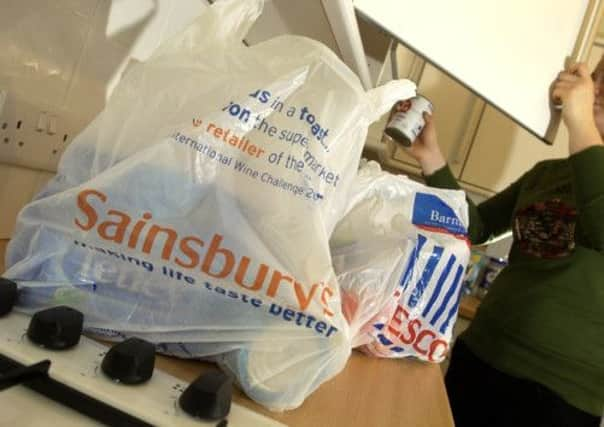Leaders: Plastic bag charge | Taxes


Now the plastic bag, or more particularly the thin insubstantial ones provided by supermarkets, has become a huge inconvenience. Stray ones litter the roadsides, festoon bushes and garland trees. More perniciously, they are a life-threatening hazard to animals and fish.
Now, thankfully, the Scottish Government, after much foot-dragging, has followed leads set in Wales, Northern Ireland and elsewhere in Europe and decided that, from September 2014, shops will have to charge 5p for every bag a shopper demands. The likelihood is that demand for bags will plummet – in Wales, bag issuance has dropped by 80 per cent since the levy was introduced. Online comments since the measure was announced suggest that many people regard this as a burdensome imposition by a busybody government. Experience from elsewhere, however, says that people rapidly adjust to the idea of reusing their own bags when they go shopping.
Advertisement
Hide AdAdvertisement
Hide AdScottish retailers, it is true, have made their own efforts to encourage their customers to reuse bags. This, they say, has cut the use of non-reusable bags by some 30 per cent.
But such is the nuisance caused by plastic bags and the despoilation of townscape and countryside by those carelessly discarded, the government is right to introduce this measure.
Presumably because they are fearful that there may be some public backlash against this levy – we note that it will come into force after the independence referendum – ministers have decided it will not be a tax-raising measure for public coffers. Instead, it will be a levy that retailers are expected to pass on to charity. Some £5 million is expected to be raised, money which no doubt many charities will welcome. But what charities? Since the plastic bag has done much damage to the environment, surely the money ought to be earmarked for measures that might repair the damage.
There are other questions. What will the small retailer, who might collect as little as £5 a week, do? Will such businesses have to garner receipts from charities to prove that they have passed on the money? And, finally, what constitutes a bag? Will this measure cover, say, a paper bag with a pastry in it from a coffee shop or even one that contains one of the many popular Gregg’s products? The Scottish Government is unclear and should clarify this point immediately.
Although a sound idea in principle, these questions suggest that the plastic bag tax could become festooned with red tape and become a burden to business. Ministers should bag and bin any such bureaucracy, and make this as simple as possible.
Let the taxman chase down our debt
Public spiritedness is routinely supposed to be in perpetual decline, yet what more dramatic evidence that it is alive and well could there be than in the revelation that, over the past decade, members of the public have donated £2.7 million to the government to help pay down the national debt.
It is magnificent, touching, but, we fear, verging on the futile as the total sum donated amounts to about 0.00025 per cent of the total outstanding government debt and only a slightly less minute slice of annual public borrowing. The money has been given both by bequest and by donations from living people. We can only imagine and marvel at the thought processes that lie behind these gestures.
Is it because the donors want to do a little bit to alleviate the burden on future generations?
Advertisement
Hide AdAdvertisement
Hide AdAre they so worried by stories of trillions being borrowed by the government that they feel it is their duty to help lift the worry that their fellow citizens must be sharing?
Or might there just be the occasional guilty conscience that full dues have not been paid and which is being salved in this way? This last thought points to a way that the government might make better use of these donations, rather than just shaving off a wafer-thin sliver from the national debt mountain.
Perhaps it would be a good idea to use the money to set up a unit of taxmen whose job is to investigate the ways that corporations, especially multinational ones, escape paying taxes that other companies dutifully stump up, and then go on to rewrite the law so that full dues are paid.
That would give real point to these donations.